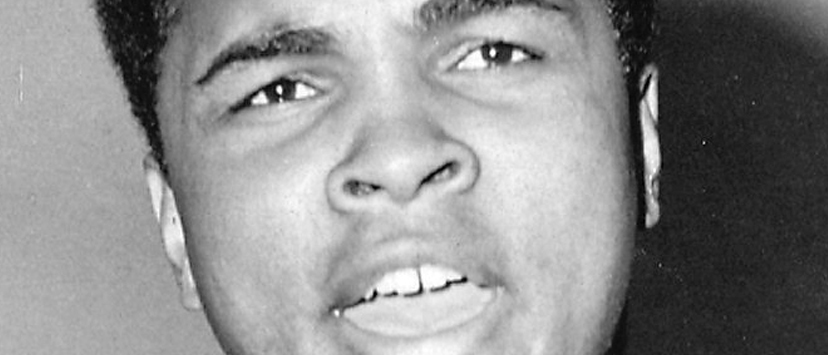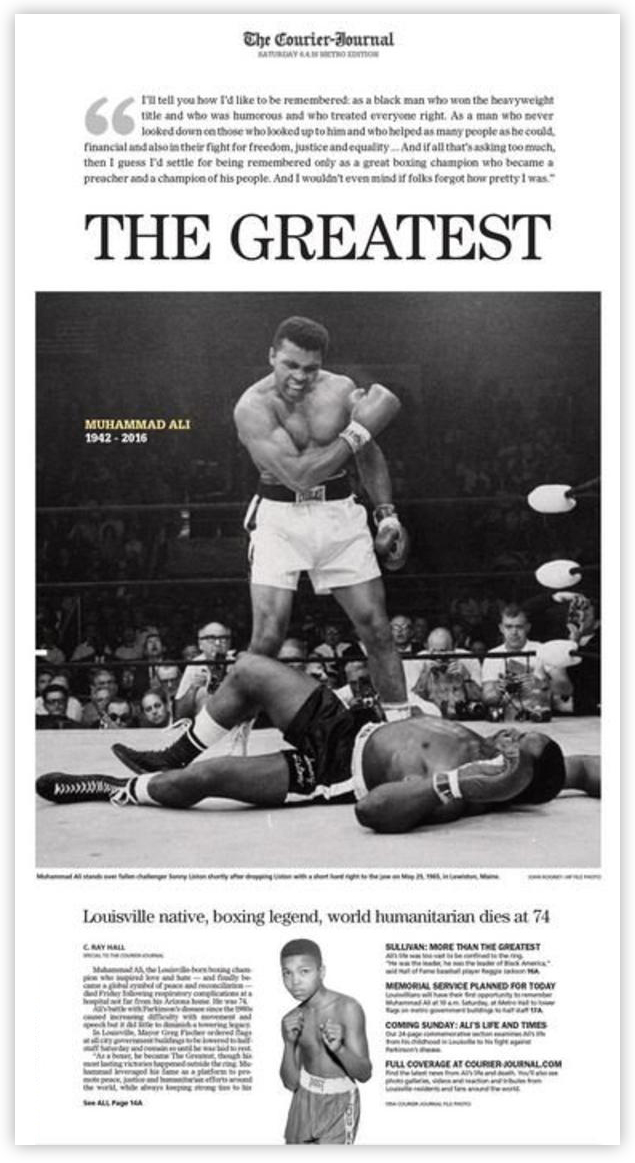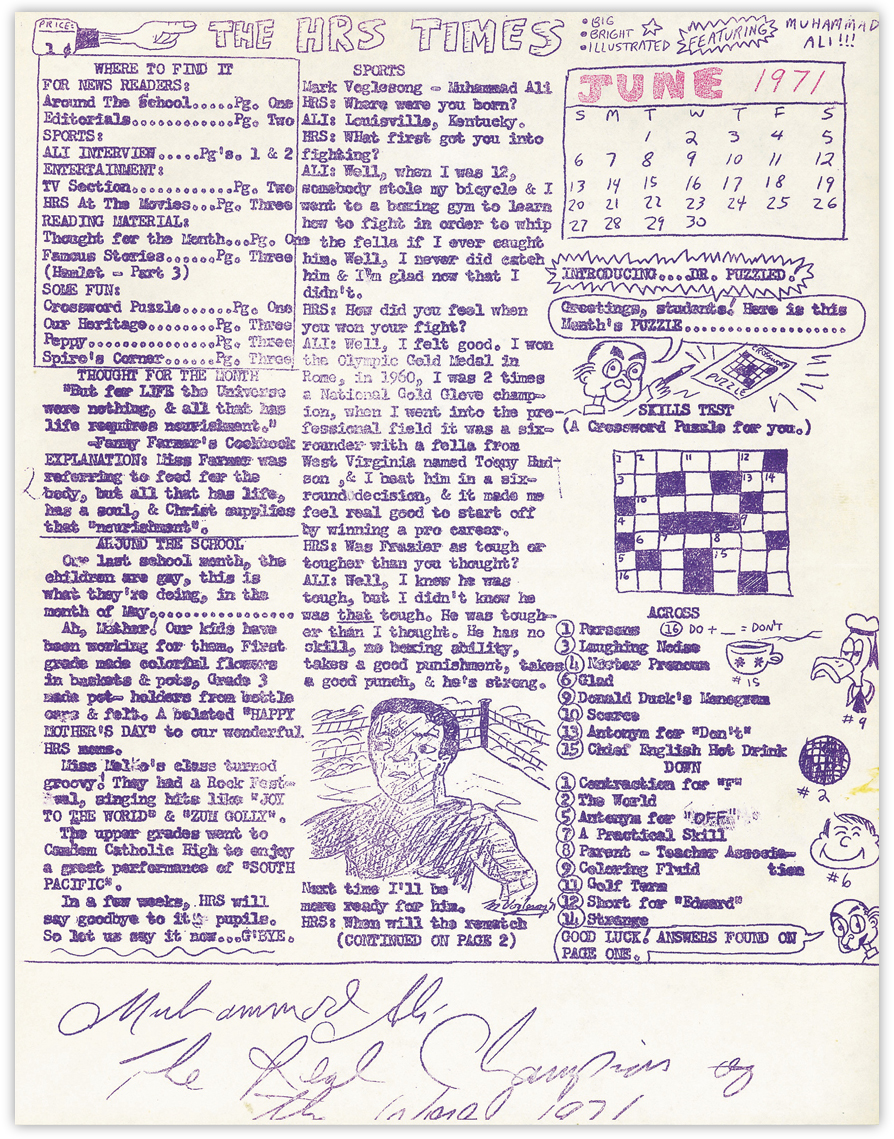
I was en route to Louisville, Kentucky, the birthplace of Muhammad Ali, when I heard on the radio that Ali had died.
Louisville’s significance as Ali’s hometown had been on my mind in the weeks leading up to my trip.
By coincidence, I happened to be Louisville-bound to collect an award for “Monster Mash,” at the 14th Rondo Hatton Classic Horror Awards (held June 4 at the WonderFest convention in Louisville).
 I was riding through Ohio at about 3 in the morning, when I heard George Foreman on the radio talking about Ali in the past tense — “he was” this, “he was” that — and I knew that Ali’s time had come. At this hour, the surrounding mountains had a darkening effect on Interstate 70, making things pitch black, which only added to a growing sense of melancholy.
I was riding through Ohio at about 3 in the morning, when I heard George Foreman on the radio talking about Ali in the past tense — “he was” this, “he was” that — and I knew that Ali’s time had come. At this hour, the surrounding mountains had a darkening effect on Interstate 70, making things pitch black, which only added to a growing sense of melancholy.
That weekend, Ali’s spirit permeated Louisville. He was on the TV screens of bars and restaurants in the loud, bustling area around Fourth Street downtown, and in hotel lobbies near the airport; in signage throughout the city; on the front page of a special edition of the Courier-Journal. He was also on the lips of Louisville’s citizens. In conversation, a local woman told me: “When I heard he was in the hospital, I figured he was gettin’ ready to go home.”
At the Rondos, I was going to speak about the genesis of “Monster Mash.” But as I awaited my category during the ceremony, I realized there was really no choice but to speak about Ali; he was all I was thinking about. Without the benefit of preparation, I tend to ramble while speaking in public. But I knew I didn’t need any notes in this case. And so, uncharacteristically, I walked to the microphone and winged it.
I said: “Thank you, Rondos. I had prepared some comments about how awesome Frankenstein is, but I finally realized that what I should really talk about is Muhammad Ali. He was born right here in Louisville. I know this because he told me.”
I then told the audience that in 1971, when I was in the seventh grade, I interviewed Muhammad Ali in his home for my Catholic school “newspaper,” The HRS (for Holy Rosary School) Times.
 I’m sure more than a few of the monster nerds assembled at the Rondos could relate when I said that in grade school, I wasn’t popular or athletic or good-looking. But when I published the Ali interview, I was suddenly (if briefly) a hero at school, an unusual feeling for me. Thereafter, I equated landing a cool interview with acceptance, and I spent my career chasing that buzz. This is why “Monster Mash” has interviews with people like Zacherley, Jim Warren, Forry Ackerman, Bobby (Boris) Pickett, “The Addams Family,” “The Munsters.”
I’m sure more than a few of the monster nerds assembled at the Rondos could relate when I said that in grade school, I wasn’t popular or athletic or good-looking. But when I published the Ali interview, I was suddenly (if briefly) a hero at school, an unusual feeling for me. Thereafter, I equated landing a cool interview with acceptance, and I spent my career chasing that buzz. This is why “Monster Mash” has interviews with people like Zacherley, Jim Warren, Forry Ackerman, Bobby (Boris) Pickett, “The Addams Family,” “The Munsters.”
So in a very real sense, “Monster Mash” would not exist if it weren’t for Muhammad Ali.
(To read the full story behind the 1971 Ali interview, click HERE.
To read my Q&A with Ali, click HERE.)
I thought my little speech at the Rondos might be somewhat off-topic, but apropos considering the timing. Then at the end of the ceremony, Rondos organizer David Colton did me one better. He concluded the festivities by showing the old black-and-white video footage of Ali in which, after his 1964 victory over Sonny Liston, the fighter declared, “I’m the greatest thing that ever lived! I don’t have a mark on my face, and I upset Sonny Liston, and I just turned 22 years old! I must be the greatest!”
Laughter and applause.
Colton also showed a Neal Adams panel from DC Comics’ 1978 edition Superman vs. Muhammad Ali. Colton then said something younger people might not be aware of: That there was a time when some people considered Ali pompous for his boastful remarks. But Ali opened a door, and taught us something about pride. In Colton’s words: “When you walk, don’t walk with your head down.”
This united the room. Even we monster nerds — not known as aficionados of sporting events — were perhaps indirectly empowered by Muhammad Ali, the most famous athlete of his time. Ali made the world a better place. And he started out right here.
After midnight that evening, I rode past Muhammad Ali Center, an architectural marvel on Sixth Street, a short walk from River Road along the Ohio River. The center wasn’t open at that late hour, but there were 10 or 12 media trucks parked outside, like silent sentinels. I saw no personnel or activity; the trucks were likely parked there to hold their spaces for tomorrow’s coverage. The scene was kind of ghostly, but also comforting. Ali still had a presence in his hometown. He was still with us.
In large type on that Courier-Journal front page, there was an Ali quote that gladdened my heart. (Thank God for good old newspapers, however battered, right?) It was from a 1975 Playboy interview, and it went like this:
“I’ll tell you how I’d like to be remembered: as a black man who won the heavyweight title and who was humorous and who treated everyone right. As a man who never looked down on those who looked up to him and who helped as many of his people as he could — financially and also in their fight for freedom, justice and equality. … And if all that’s asking too much, then I guess I’d settle for being remembered only as a great boxing champion who became a preacher and a champion of his people. And I wouldn’t even mind if folks forgot how pretty I was.”
